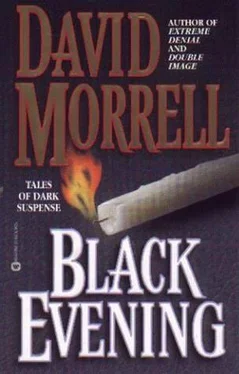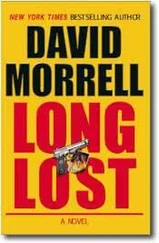David Morrell - Black Evening
Здесь есть возможность читать онлайн «David Morrell - Black Evening» весь текст электронной книги совершенно бесплатно (целиком полную версию без сокращений). В некоторых случаях можно слушать аудио, скачать через торрент в формате fb2 и присутствует краткое содержание. Жанр: Ужасы и Мистика, на английском языке. Описание произведения, (предисловие) а так же отзывы посетителей доступны на портале библиотеки ЛибКат.
- Название:Black Evening
- Автор:
- Жанр:
- Год:неизвестен
- ISBN:нет данных
- Рейтинг книги:4 / 5. Голосов: 1
-
Избранное:Добавить в избранное
- Отзывы:
-
Ваша оценка:
- 80
- 1
- 2
- 3
- 4
- 5
Black Evening: краткое содержание, описание и аннотация
Предлагаем к чтению аннотацию, описание, краткое содержание или предисловие (зависит от того, что написал сам автор книги «Black Evening»). Если вы не нашли необходимую информацию о книге — напишите в комментариях, мы постараемся отыскать её.
Black Evening — читать онлайн бесплатно полную книгу (весь текст) целиком
Ниже представлен текст книги, разбитый по страницам. Система сохранения места последней прочитанной страницы, позволяет с удобством читать онлайн бесплатно книгу «Black Evening», без необходимости каждый раз заново искать на чём Вы остановились. Поставьте закладку, и сможете в любой момент перейти на страницу, на которой закончили чтение.
Интервал:
Закладка:
Of course. Some birds had somehow gotten into the attic, and they'd heard him, going silent. She had gone up there to look, and maybe she was hurt. He didn't think until later that the trapdoor would be open if she had. He knew only that he needed to look, and quickly, so he scrambled up, and there was nothing. Insulation, cobwebs, wiring. But no sign of her, no birds, no laughter, nothing. There was must all through the close stale air, and he checked in the corners, sweating, and he still found no sign of her. He thought too late that he had climbed around up there without first looking for a disturbance in the dust. Now, with the smudge marks where he had knelt among the rafters, he could never tell if someone had preceded him. He listened for the cooing, looking for some explanation. When the sweat became too much for him, he eased back, leaving.
Outside, he was puzzled. He checked with the neighbors again. There'd been a man she talked to. Someone now remembered that. But everyone was certain that she'd been alone when she'd returned to the house. He walked back, looking. Then he asked if he could use a neighbor's phone. He called other friends. He called the hospital and on an impulse the police. No help, no sign of her, and since there was no evidence of something wrong, he learned that no policemen would be coming out. "Just give her time. She'll be back."
He left the neighbors, returning to the house. But this time when he studied it, the dusk now gray around it, he was conscious of a sound, no, something less than that, something on the other side of hearing, more a presence than a sound, coming from the house. He took a step. The thing subsided. A moment later, it rose again, closer, stronger. He could almost touch it, hear it. He continued toward the house. Music, unseen, unheard, faint and tinkling, merry, far away, yet close. When he reached the door, he recognized the coo-coo-coo, and yes, he did hear laughter, children's laughter, but he burst in, and the house was dark, and there was no one. The laughter stopped, although it hadn't really been there. It was all in his imagination.
He has heard it many times since then, however, and he comes back often just to stand and wait and let it happen, so much so that now he owns the place again. He lives there with his children, who don't remember her. The years have led them forward. Flashes now and then, but little recollection, and he asks them, but they do not hear the laughter.
And the answer? The police at first suspected that he killed her, but they found no body, and he managed to convince them of his innocence. He had seldom argued with her, had always seemed to like her. There was no other woman and no insurance as a motive. Still he often wonders. With this tendency of his to be both "I" and "he," in past and present, he could maybe have a double personality. He could have killed her, and as someone else, he never would have known about it, although he can't find a reason he would have.
All right, she was kidnapped. But there was never a ransom note, and his mind can't sustain the thought of what a kidnapper who left no note would do to her. Imagining his wife alone and trembling, he continues to hope that one day she'll come back to him. He even hopes, although this would normally be painful, that she left him, that the changes they'd been going through weren't half so good as when they first had started, that the man whom someone might have seen had been a secret friend who led her to a better life.
He wishes, and he grieves and, in his constant emptiness, imagines that she actually is with him, all around him, that she never went away but only back.
To where? he asks himself and answers – to her youth, her innocence.
His theory is fantastic, although consoling: that in every person's life there is a place that one can fall through, even by choice slip through, that she lives now with the laughter in a better time and space; and sometimes he can hear a woman in among the children's laughter, playing games perhaps or just enjoying, bringing home to him those words from Eliot again. What might have been. What has been. My words echo with the laughter.
Four stories in ten years. I'm not prolific. Do authors who are prolific have a secret weapon, something that increases their output – a special typewriter, for example? The following story, a mix of darkness and humor, portrays the bleak side of author envy. It's longer than my previous stories and, with a few exceptions, establishes a trend – from this point on, you'll be reading mostly novellas. Many of the cultural references in this piece, Truman Capote and Johnny Carson, for example, are now out of date, but when I attempted to substitute current equivalents, the story didn't work. At first puzzled, I finally realized why Truman and Johnny had to stay. This story belongs in 1983, the year it was published. After all, if it were current, it would have to be about a word processor.
The Typewriter
Eric tingled as if he'd touched a faulty lightswitch or had stepped on a snake. His skin felt cold. He shuddered.
He'd been looking for a kitchen chair. His old one – and the adjective was accurate – in fact, his only kitchen chair had been destroyed the previous night, crushed to splinters by a drunken hefty poetess who'd lost her balance and collapsed. In candor, "poetess" was far too kind a word for her. Disgustingly commercial, she'd insulted Eric's Greenwich Village party guests with verses about cats and rain and harbor lights – "I hear your sights. I see your sounds." – a female Rod McKuen. Dreadful , Eric had concluded, cringing with embarrassment.
His literary parties set a standard, after all; he had his reputation to protect. The Subway Press had just released his latest book of stories, After Birth . The title's punning resonance had seemed pure genius to him. Then too, he wrote his monthly column for the Village Mind , reviewing metafiction and post-modern surreal prose. So when this excuse for a poetess had arrived without an invitation to his party, Eric had almost told her to leave. The editor from Village Mind had brought her, though, and Eric sacrificed his standards for the sake of tact and the continuation of his column. In the strained dry coughing that resulted from her reading, Eric had majestically arisen from his tattered cushion on the floor and salvaged the occasion by reciting his story, "Cat Scat." But when he later gaped at the wreckage of his only kitchen chair, he realized how wrong he'd been to go against his principles.
The junk shop was a block away, near NYU. "Junk" described it perfectly. Students bought their beds and tables from the wizened man who owned the place. But sometimes, lost among the junk, there were bargains, and more crucial, Eric didn't have much choice. In truth, his stories earned him next to nothing. He survived by selling T-shirts outside movie theaters and by taking handouts from his mother.
Leaving the hot humid afternoon, Eric entered the junk shop.
"Something for you?" the wrinkled owner asked.
Sweating, Eric said aloofly, "Maybe. I'm just browsing."
"Suit yourself, friend." The old man sucked a half-inch of cigarette. His yellow fingernails needed clipping. He squinted at a racetrack form.
The room was long and narrow, cluttered with the leftovers of failure. Here, a shattered mirror on a bureau. There, a musty mattress. While sunlight fought to reach the room's back reaches, Eric groped to find his way.
He touched a grimy coffee table with its legs splayed. It sat on a sofa split down the middle. Dirty foam bulged, disintegrating. Pungent odors flared his nostrils.
Kitchen tables. Even one stained kitchen sink. But Eric couldn't find a kitchen chair.
He braved the farthest corners of the maze. Tripping over a lamp cord, he fell hard against a water-stained dresser. As he rubbed his side and felt cobwebs tickling his brow, he faced a dusty pile of Liberty , Colliers , and Saturday Evening Post and saw a low squat bulky object almost hidden in the shadows. That was when he shuddered, as if he'd touched a spider's nest or heard a skeleton's rattle.
Читать дальшеИнтервал:
Закладка:
Похожие книги на «Black Evening»
Представляем Вашему вниманию похожие книги на «Black Evening» списком для выбора. Мы отобрали схожую по названию и смыслу литературу в надежде предоставить читателям больше вариантов отыскать новые, интересные, ещё непрочитанные произведения.
Обсуждение, отзывы о книге «Black Evening» и просто собственные мнения читателей. Оставьте ваши комментарии, напишите, что Вы думаете о произведении, его смысле или главных героях. Укажите что конкретно понравилось, а что нет, и почему Вы так считаете.












